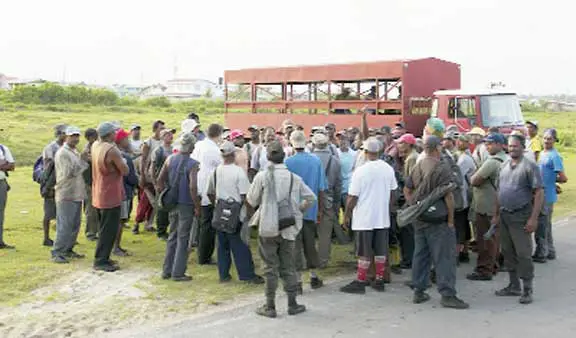
Enmore Sugar Workers on Strike Again
The Alliance for Change, represented by Gerhard Ramsaroop and Kojo McPherson, and accompanied by political activist, Freddie Kissoon, on Thursday, 8 March 2012, met with the Enmore sugar workers who were on strike once again, at the Enmore Martyrs’ Monument. This strike was called out of solidarity for their fellow workers who were injured and had other health related issues that were not being dealt with adequately or fairly by the National Insurance Scheme (NIS) and the Guyana Sugar Corporation (GuySuCo).
Seetaram Bramnarain was injured on the job in December (2011) last, and with his ankle still visibly swollen is unable to return to work, but has a NIS note saying he is fit. In the time that he was off the job he only received the equivalent of ten days pay, some $24,000, and he is his family’s sole breadwinner. He is at a total loss at the NIS’s evaluation of him and frustrated that he is not receiving adequate compensation, while his bills, including for electricity, are mounting up. He has a daughter in school and is worried about his electricity being cut off.
Seemangal Chatiram has a heart condition and he too is lamenting that he is not being compensated. Mohamed Ali severely fractured his leg last June (2011) for which he had to have an external fixation device. He only received 6 months of benefits from NIS, which then abruptly stopped. His wife complained bitterly of being given the royal run-around since. Many of the other workers protested loudly that periods during which they made NIS contributions remain unaccounted for, and are holding GuySuCo responsible since they expect the corporation to maintain proper records.
On the morning of the strike, a worker fell ill and was rushed to the estate clinic, but no medic was present. This is despite there being a house built for a resident medic, but which is now occupied by Bell loader operators. The worker was then placed in the ambulance to be taken to the Georgetown Public Hospital. However, the ambulance, which is in a clear state of disrepair, only made it as far as La Bonne Intention (LBI). The ambulance’s engine sputters and smokes excessively (the smoke and smell of gasoline which then gets inside the vehicle), the tyres are second-hand and euro-band was used to cover rotted holes in the body. The ambulance, on its return to the estate, was stopped by the workers so that the media could have a good look at it.
The workers were also aggrieved with the conditions of work when the estate is not grinding canes. They said that they are supposed to be given four days of work per week, at an average of pay of $10,000. However, they say that the tasks they are given often take more than a day to complete and therefore, they have to work for more than four days to receive four days’ pay. The low pay, coupled with the bad conditions, forces them to seek alternative incomes away from the estate. Other workers, who are paid by the day, and not by the task, said they were promised an evaluation with the aim of raising their pay from some $1,500 a day to $2,500, but that promise remains unfulfilled.
The workers reiterated the issues that they placed squarely at the feet of management, such as cane being planted far in the backdam costing some G$133M, but because no canals were dug and the soil being too soft for tractors and trailers, the cane had to be left uncut; the dumping of 126 punts of cane (at an average of 5 tonnes per punt) which would adversely affect their annual production incentive (API); the new tractors that were reportedly bought for some G$18M each, and didn’t last more than a few weeks in the fields before experiencing major damage, for which there was no apparent warranty; unusually large losses to theft such as 128 heavy-duty tyres and 500 20-foot drainage tubes, with little consequent increase in security, leading the workers to believe that these were inside jobs; and the unusual breaking of booms on newly purchased Bell loaders.
Many of the workers live in Foulis, close to the estate, and they also raised some the issues affecting that community. They said the lack of proper drainage and functioning pumps meant frequent flooding at the slightest rainfall, which adversely affects their kitchen gardens and livestock that they depend on for both food and an extra dollar. Recently they said they were told they had to pay $1,000 per household per month for garbage collection. This would amount to $763,000 per month and they cannot understand why so much money is needed, especially when they are already paying rates and taxes.
The AFC once again, made it clear to the workers that it was not there to replace the union (GAWU), but to highlight their issues with the aim of timely resolutions. The AFC emphasised that the sugar industry is in trouble and that it must not be allowed to collapse. It is vital not just as a major employer and foreign exchange earner, but also for the enormous contribution it can make to the energy sector through bagasse and ethanol.
End.

Enmore Sugar Workers on Strike

Gerhard Ramsaroop and Freddie Kissoon with the Enmore Sugar Workers

Let progress continue...


Let progress continue...

Let progress continue...

The Enmore Estate Ambulance

Mohamed Ali's fractured leg

 AFC representatives Kissoon and Ramsaroop speaking with Enmore estate sugar workers Thursday morning.
AFC representatives Kissoon and Ramsaroop speaking with Enmore estate sugar workers Thursday morning.


